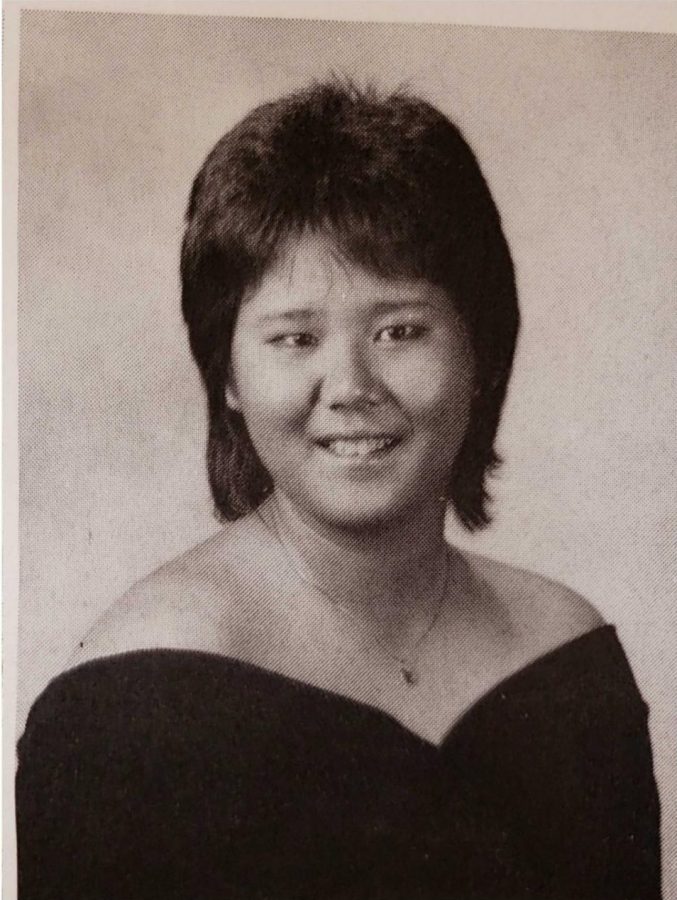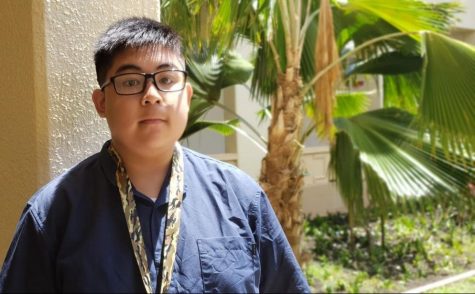Hall of Honor inductee reflects on years at McKinley
By Courtesy of Black and Gold 1983
Hall of Honor inductee Leilani Okuda reflects upon her years as a McKinley High School student.
February 23, 2020
Until this year, Leilani Okuda was highlighted for umpiring at the Olympics. Now she can add onto her titles Hall of Honor member. She was inducted during an assembly in McKinley High School’s gymnasium on Jan. 31.
Okuda was born and raised in Honolulu, Hawaii. She attended Kauluwela Elementary School, Central Middle School, and McKinley High School. She later went onto the University of Hawaii System at Honolulu Community College and then onto the University of Hawaii at Manoa. She was a teacher in McKinley for one year in 1995, moved to Radford and came back to McKinley in 1999. Okuda said she is proud that she was a student in McKinley and that she wouldn’t want to work anywhere else and part of that special part of being here are the students at McKinley.
“McKinley has always been a special place for me,” she said. “My experiences here have an important role in shaping me who I am today.”
Okuda teaches PE but she has also been the driver education coordinator, adviser of the National Honor Society, a class adviser, and a softball coach.
“I love sports and I had really good role models as physical education teachers all the way from my days at Central Intermediate and here at McKinley,” she said. “They made learning fun.”
Okuda played softball, soccer and basketball. She took part in Judo, Track and Field, was a part of the Daily Pinion and was a part of the student government. She said she had many memorable moments as a McKinley student and it was by participating in activities.
“When I got involved, that’s where you sort of find your friendships,” she said. “They became my lifelong friends. Going to games together, taking part in the activities, and anything that we did as students became really memorable.”
Okuda said she believes PE is a place where everybody can come together to learn about the concepts of sports as they play, whether or not they can understand English.
“Somehow, in the world of sports, we find commonality,” she said. “PE is very enjoyable for me and I hope it is for my students, too.”
Okuda said her teaching philosophy is to help PE students to become efficient movers.
“The students are important and the idea that makes students want to learn so we have to try to find a way for students to get better at whatever is needed,” she said. “In the case of physical education, that came a little bit easier for me because I like sports. Some of my teachers found a way to make learning easier to understand and from there, follow the students’ growth.”
There’s a philosophy by Toyota (Kaizen) which means constant improvement. Okuda said it has always been her philosophy in everything she does.
“Whatever you do, you don’t stop and be satisfied,” she said. “You always want to try and make things better. It’s not necessarily that you’re always changing something, but if there’s a way to make it a little better or a little easier for students and you want to do that.”
Okuda said she has a passion for coaching softball.
“When I was coaching here; just working with the athletes on an everyday basis, that was pretty special,” she said.
Okuda said one thing that people would know about her is that she has a passion for softball.
“When they see me, there’s that association with the sport of softball,” she said.
Okuda said some challenges of being a PE teacher are students who don’t like participating and bad weather.
“We try to encourage them [and] try to make it fun for them,” she said. “We always have to work around the weather, so if it’s raining [then] we can’t go outside.”
Okuda said PE being an activity-based class gives the PE department a bad reputation because of not being a traditional reading and writing type of classroom.
“We develop different types of learners,” she said. “We have to remember that we are performance-based, just like band and maybe art. There is an appreciation for what we do.”
Okuda said her favorite memory was always the faculty play as a teacher.
“We used to look forward to taking part in faculty play,” she said. “We haven’t had one in a while but we would be working with the rest of the faculty and putting on a play for the students.”
Okuda said her second favorite memory is to see students grow from their freshman year all the way through their senior year.
“Those are memories that I cherish,” she said. “We get to see them mature as young adults and it’s always a little emotional when you finally get to see them graduate and just to know that we had a little part of their experiences here.”
Teaching driver education is one of Okuda’s specialties. She said she delves into healing art as one of her hobbies.
“I have a license as a massage therapist and a Reiki practitioner,” she said.
Okuda said she also enjoys watching television for fun, to catch up with news and reading for fun.
“I like to watch Korean dramas whenever there’s a free moment,” she said. “Sometimes I like to read short books and biographies. I haven’t had an opportunity to do that too much since I’ve been teaching driver ed.”
Okuda is an umpire in the Olympics. As an umpire, she judges an athletic event and calls if a person is safe. She said there are positives and negatives of being an umpire.
“The bad side is one side will always be mad at you at times,” she said. “They won’t like your call and so forth. In that sense, umpire becomes a little challenging.”
Okuda said she enjoys umpiring and being an official of softball because it helped her stay a part of the game that she loves.
“There came a moment when you know that you can no longer play the game, [because] you can’t run as fast as the younger participants,” she said.
Okuda said being at the Olympics was an extraordinary moment because she was on the field with Olympians who were the best in the game of softball.
“At the Olympics, we played a small part of the opening ceremony,” she said. “We were able to be on the field with the best in the game. I got to sit in the best seat in the house which is on the field.”
Okuda said being an umpire for the Olympics was a memorable experience.
“It was very tense at times because it is a competition and they’re representing their nation,” she said. “There is a lot of pressure and stress put on you as an official but at the same time, it is an enjoyable moment and it was a very humbling experience to be able to represent my country (USA) at the Olympics.”
Sophomore Ronya Malae said she was surprised when she heard that Ms. Okuda had a role in the Olympics and that she is a role model.
“Ms. Okuda is definitely an inspiration for many,” she said. “Hearing that she umpired for the Olympics has inspired me to work harder and smarter, to be resilient and to believe in myself.”
Okuda said she was sad to hear what happened with 40-year-old Kobe Bryant.
“He’s been an icon in the world of basketball and it was sad to see or hear what happened,” she said. “You have to think about our own lives and realize that life can be short and we don’t have control of that so we really have to make the best of it and do our part in the world just like he did.”
Okuda said the administration building changed when she was a student. One of the changes was the placement of the library.
“When I came as a tenth grader, by the time I left as a senior, that library (originally upstairs in the administration building) was then rebuilt in another building,” she said. “The traditions on campus, I feel like you never appreciate it until you go to another campus.”
The athletic area had a big improvement. Okuda said she would like to thank Mr. Neal Murray because he had a vision for what he wanted in the athletic area.
“We have a wonderful Olympic-sized track, a softball stadium, and of course our original gymnasium that is still in good shape,” she said. “As a student here at McKinley, when I played softball, we couldn’t play in that stadium; we didn’t have a field because of gender equity. I had to catch the bus after school all the way to Ala Wai where Ala Wai elementary is and we had to practice and play there.”
When Okuda was a student at McKinley, the campus had lollipop trees starting from King St. which was infested by bugs. She said the campus had hardly any litter and had a feeling of pride from the students to the custodians to the faculty.
“That feeling is still there on our campus as far as the aesthetic,” she said.
Okuda still considers herself as a student because she still learns as a teacher. She said appreciating McKinley is important.
“We have to love where we are and really take care of it [and] make it last for future generations,” she said.
Okuda said W-building has improved after renovating.
“You folks are very lucky to be in this new modern building,” she said. “Learning is now innovative and up-to-date.”
Okuda traveled within the US throughout her career. When she traveled internationally, she went to Japan, Greece, Taiwan, and Australia. Okuda said she enjoyed visiting Japan.
“I could understand the language and their transportation system, getting on the train and so forth, was a little easier for me.,” she said. “I enjoy the sights and also because I learned a little bit about my family. I was appreciative of that.”
Okuda said she visited Taiwan.
“Because we were dignitaries, they took us to a Buddhist temple that is now closed off to the public,” she said. “I was just honored and inspired and appreciative of all of those countries that I got to go to.”
Australia was another country that Okuda visited. She said she wasn’t able to explore more of it.
“I got to see the Sydney Opera House, the harbor,” she said. “We were limited to a couple of days of sightseeing. If I had the opportunity, I’d like to go back there.”
Okuda said Greece was also interesting because she experienced where the original Olympics were held and the Acropolis.
“When I got up there, it [was] all falling,” she said. “One of the most interesting things was the marble stones and to go up there and just to know that you were in the house of gods.”
Okuda said she was able to go to the Athens Olympics in 2004.
“It was spectacular to me just to know that the original Olympics were held there (Greece),” she said.
Okuda said she was overwhelmed and humbled when she found out she was inducted in the Hall of Honor.
“There are many distinguished alumni that are currently in the Hall of Honor and just to think that I’ll be joining them was a nice shock; a little overwhelming but very humbling,” she said.
Okuda knew other Hall of Honor inductees. Inductee Mr. Neil Takamori was a teacher and a coach at McKinley when Okuda was a student. Okuda said he was a role model and mentor to her.
“When I came back to McKinley, I worked under him as a coach and he continued to be a mentor as I coached under him,” she said. “He’s a very good friend and continues to be a mentor.”
Okuda said Honorable Judge Chang is an inductee in the Hall of Honor who was introduced to her as a role model of McKinley.
“It’s always nice to talk to him,” she said.
Inductee Suzanne Chan was a senator/representative in Okuda’s district and has been a role model. Okuda said the other inductees made her proud and humbled to be among them.
“They’re an excellent representation of McKinley and I’m proud and humbled to be among them,” she said.
As a student, Okuda had many mentors and teachers that made her experience as a student memorable. She said one of them is Ms. Bobby Kukuda.
“She made learning fun and she made you think,” she said. “At times I almost felt there was a parent at school because she always made you think about not just what you’re learning in class but me as a person and my character and so forth.”
Okuda said Mrs. Diane Tsujihara was a librarian and English teacher Mrs. Ebbu Chao helped her decide to become a teacher.
“They were excellent role models and made me think that if I was going to be a teacher, what kind of teacher would I want to be,” she said.
Okuda’s PE teacher in Central Middle School, Milton Hirohata, and Okuda’s PE teacher in McKinley, Peggy Anderson, were her role models. Okuda said they inspired her to not just become a teacher but in the area of physical education.
“There weren’t many female teachers as role models so she was one that really enjoyed herself as a teacher and the amount of time that she gave to students outside of the classroom,” she said. “That inspired me that it wasn’t just about playing sports or playing with students, but was this responsibility that you also need to give back outside the classroom.”
Okuda said being inducted into the Hall of Honor was unexpected.
“I never really thought about [being inducted],” she said. “When you walk down that hallway, it never entered my mind whereas ‘that’s where I want to be.’ What I always do when I walk through the hall is [I] look at those pictures.”
Okuda said the alumni in the Hall of Honor served as an inspiration to perform the best work possible.
“You want to live your best and be at your best,” she said. “Not all of them are going to be senators and so forth. There are a variety of things [that] they’re recognized for and whatever career or whatever they’ve done. It was just a reminder that whatever you do, you want to know what you need to do and be your best at it.”
Acknowledging people who helped you along the way to make your road easier is important. Okuda said being grateful when rising to the rank is advice that everyone should take.
“Sometimes we always want more or we feel that we don’t have enough but if you take a look at it from wherever you are, that’s a good starting place,” she said. “We never achieve anything without the help of others.”
Okuda said believing in yourself is also an important aspect of a successful person.
“There are times in my career when I may have made mistakes or I felt I wasn’t good enough or [that] I failed,” she said. “Many times I could have just said ‘okay, this is not for me,’ but that wasn’t the case.”
Malae said Okuda is an encouraging, determined and hardworking person.
“She knows that each and every student has potential and she makes sure that we know that too,” Malae said. “She’s changed so many lives and continues to do so. Whether as a teacher, a club advisor, a coach or an umpire. She’s driven, and a great model for our Tigers to follow after.”
Learning to persevere and believing that goals are achievable in addition to being industrious in the pursuit leads to success in accomplishing goals. Okuda said working hard and appreciating the lessons towards a goal makes a successful person.
“Just because you fail at something, it doesn’t mean that you’re not good at it,” she said. “You have to take a look at where you are and appreciate some of the lessons that may come from it and work from there. If you really want something, you have the ability to make it happen. Work hard and never forget that the person that’s most important in this is you believing in yourself.”






